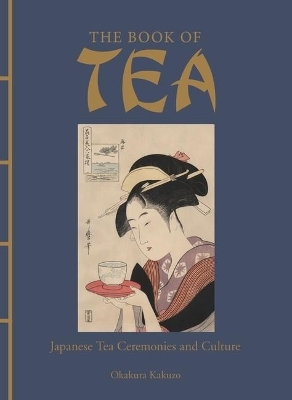
The Book of Tea
Japanese Tea Ceremonies and Culture
Seiten
2021
Amber Books (Verlag)
978-1-83886-109-4 (ISBN)
Amber Books (Verlag)
978-1-83886-109-4 (ISBN)
The Book of Tea, written in English in 1906 for a Western audience, celebrates the secular art of the Japanese tea ceremony and linking its importance with Zen Buddhism and Taoism. Covering cultural life, aesthetics and philosophy, this is an exquisitely produced edition using traditional Chinese bookbinding techniques.
‘Tea began as a medicine and grew into a beverage,’ are the opening words of Okakura Kakuzō’s The Book of Tea, written in English in 1906 for a Western audience. The book is a long essay celebrating the secular art of the Japanese tea ceremony and linking its importance with Zen Buddhism and Taoism. It is both about cultural life, aesthetics and philosophy, emphasising how Teaism – a term Kakuzō coined – taught the Japanese many things; most importantly, simplicity, which can be seen in Japanese art and architecture. Looking back at the evolution of the Japanese tea ceremony, Kakuzō argues that Teaism, in itself, is one of the profound universal remedies that two parties could sit down to. Where the West had scoffed at Eastern religion and morals, it held Eastern tea ceremonies in high regard.
With a new introduction, this is an exquisitely produced edition of a classic text made using traditional Chinese bookbinding techniques. Surely it’s time for tea.
‘Tea began as a medicine and grew into a beverage,’ are the opening words of Okakura Kakuzō’s The Book of Tea, written in English in 1906 for a Western audience. The book is a long essay celebrating the secular art of the Japanese tea ceremony and linking its importance with Zen Buddhism and Taoism. It is both about cultural life, aesthetics and philosophy, emphasising how Teaism – a term Kakuzō coined – taught the Japanese many things; most importantly, simplicity, which can be seen in Japanese art and architecture. Looking back at the evolution of the Japanese tea ceremony, Kakuzō argues that Teaism, in itself, is one of the profound universal remedies that two parties could sit down to. Where the West had scoffed at Eastern religion and morals, it held Eastern tea ceremonies in high regard.
With a new introduction, this is an exquisitely produced edition of a classic text made using traditional Chinese bookbinding techniques. Surely it’s time for tea.
Okakura Kakuzō (1862–1913) was a Japanese scholar who contributed to the development of arts in Japan and the promotion of Asian culture to the West. He wrote his major books in English.
Introduction
I. The Cup of Humanity
II. The Schools of Tea
III. Taoism and Zenism
IV. The Tea-Room
V. Art Appreciation
VI. Flowers
VII. Tea-Masters
| Erscheinungsdatum | 17.11.2021 |
|---|---|
| Reihe/Serie | Chinese Bound |
| Zusatzinfo | Line drawings, color |
| Sprache | englisch |
| Maße | 196 x 265 mm |
| Gewicht | 800 g |
| Themenwelt | Sachbuch/Ratgeber ► Essen / Trinken ► Getränke |
| Sonstiges ► Geschenkbücher | |
| Geschichte ► Teilgebiete der Geschichte ► Kulturgeschichte | |
| Geisteswissenschaften ► Religion / Theologie ► Buddhismus | |
| ISBN-10 | 1-83886-109-2 / 1838861092 |
| ISBN-13 | 978-1-83886-109-4 / 9781838861094 |
| Zustand | Neuware |
| Informationen gemäß Produktsicherheitsverordnung (GPSR) | |
| Haben Sie eine Frage zum Produkt? |
Mehr entdecken
aus dem Bereich
aus dem Bereich
Die Revolution des Gemeinen Mannes
Buch | Softcover (2024)
C.H.Beck (Verlag)
CHF 16,80
vom Mittelalter bis zur Gegenwart
Buch | Softcover (2024)
C.H.Beck (Verlag)
CHF 16,80


